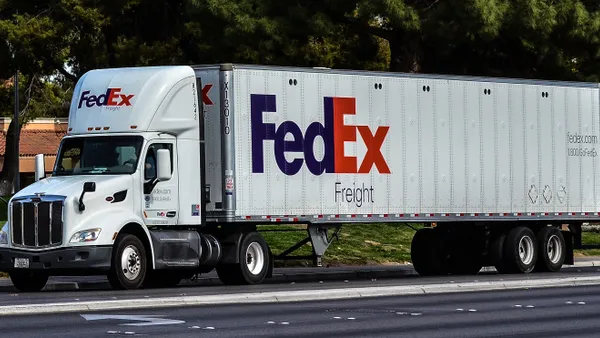Dive Brief:
- The number of trucking companies that have gone out of business has more than tripled in the first half of 2019 compared to the same time period last year, according to numbers provided to Supply Chain Dive by Broughton Capital. In the first half of 2019, 640 trucking companies left the market.
- At the same time, the average size of the trucking companies going under has risen. The average size of a trucking company that went out of business in the first half of 2019 was 30 trucks, up from 9 in 2018.
- This is happening as costs have increased for trucking companies and prices on the spot market have gone down. "So when your costs increase and the spot prices go down, to the extent that you’re exposed to spot, you can go from being profitable to unprofitable very quickly," Donald Broughton, the principal and managing partner at Broughton Capital, told Supply Chain Dive in an interview.
Dive Insight:
Analysts blame new trucks and higher driver salaries as two factors creating increased costs, leading to more trucking companies going out of business.
Some trucking companies decided to upgrade equipment and increase driver pay at the end of 2018. The market was hot in 2018, so a lot of companies had money to invest. These costs are embedded, you can't take them back, Broughton said, and since the beginning of the year demand and spot rates have fallen. This has left companies with larger financial obligations and less money coming in.
This swing can be seen in the number of trucking orders placed over the last year. Orders for Class 8 trucks reached a peak in August 2018 with 53,040 net orders, but this has been sliding ever since. The most recent numbers available from ACT Research are for July 2019 when 10,299 net orders were placed — a more than 80% drop since August 2018.
Production of Class 8 trucks has been higher than sales for the last five months. This has pushed inventory levels higher than at any point in the last two an a half years, according to ACT Research.
These higher inventory levels "will ultimately be paid back in future production levels," Kenny Vieth, ACT ’s president and senior analyst, said in a statement. This means at some point truck manufacturers will have to slow production as inventory piles up.
"Large new inventories and deteriorating freight and rate conditions suggest erring on the side of caution remains the right call," Vieth said. "When the change comes, it is likely to come fast, and we are encouraging our subscribers to be prepared for down weeks starting as early as Q4."
There is another factor to consider in these failures, Broughton told Supply Chain Dive: technology. FedEx Freight, XPO, Old Dominion and other larger operations have invested heavily in technology over the last few years. This tech gives them real-time insight into what they're doing and helps them make changes in real-time.
"They’re achieving line haul utilization rates that are much higher than people who have not invested in those systems," he said. This allows larger companies to operate at a lower price level than those who have not invested in this technology and still make a profit.
"Anytime that happens in any business … they’re going to steal your market share and you’re going to be out of business in a matter of time," he said.













